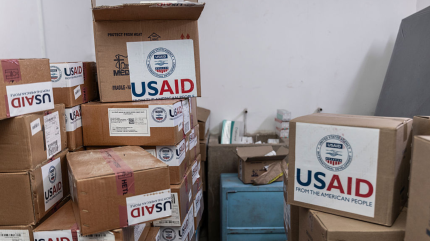
Global funding cuts, including those made by the Trump administration, are set to increase cases of human immunodeficiency virus (HIV) in Africa, research suggests.
At the 2025 International AIDS Society (IAS) meeting, taking place from 13 to 17 July in Kigali, Rwanda, researchers will present several studies that address the current political and financial issues affecting the HIV response, including the implications for Africa and the rest of the world.

Discover B2B Marketing That Performs
Combine business intelligence and editorial excellence to reach engaged professionals across 36 leading media platforms.
Abstracts to be presented will show the impact of the financing cuts, as well as how personnel on the ground, including experts and advocates, are working to address these new and urgent challenges.
IAS president Dr Beatriz Grinsztejn said: “On the one hand, we’re witnessing extraordinary scientific breakthroughs that could transform prevention and treatment and even bring us closer to a cure.
“On the other hand, these very advances are under threat from massive funding cuts that risk stalling clinical trials, slowing our progress, and jeopardising the progress we’ve fought so hard to achieve.”
PEPFAR funding cuts set to increase HIV incidence
One abstract will examine projected changes in HIV incidence, mortality and access to pre-exposure prophylaxis (PrEP) in sub-Saharan Africa following the discontinuation of the US President’s Emergency Plan for AIDS Relief (PEPFAR).

US Tariffs are shifting - will you react or anticipate?
Don’t let policy changes catch you off guard. Stay proactive with real-time data and expert analysis.
By GlobalDataPrEP funded by PEPFAR was received by nearly 700,000 people living across 28 sub-Saharan African countries by late 2024; however, funding was paused in January 2025. The study indicates that this pause could lead to around 6,671 extra HIV infections over a year and 3,617 further infections over the next five years.
Another abstract, set to be presented by Khensani Chauke of the Gauteng Provincial Department of Health, Pretoria, South Africa, will explore the impact in Johannesburg after the Accelerating Program Achievements to Control HIV Epidemic (APACE) award, funded through PEPFAR, was withdrawn in February 2025.
The study team has compared HIV tests, HIV diagnoses and antiretroviral therapy (ART) initiations from 2023 to 2025 and has already seen that testing decreased by 8.5% from Q1 2024 to Q1 2025. There was also a 31% decline in HIV diagnoses and a 30% decline in ART initiations. HIV positivity declined from 3% to 2.2%.
Mozambique sees 25% reduction in ART initiation
Mozambique has the third highest number of people living with HIV worldwide, with around 2.4 million people living with HIV.
As a result, the US funding freeze had an immediate impact on the African country, with the number of patients accessing ART declining by 25%, from more than 22,000 in February 2024 to just over 17,000 in February 2025.
To be presented by International AIDS Society’s senior technical adviser Anna Grimsrud, the real-world study also noted a 38% reduction in viral load tests performed in adults.
Among children, there was a 44% reduction in viral load tests, a 71% decrease in test results received and a 43% drop in virally suppressed results, indicating a higher impact on the paediatric population.
The study projects that if the funding interruption persists, Mozambique could see a 15% rise in HIV infections and a 10% increase in HIV-related deaths by the year 2030.
Conference set to demand action
The IAS 2025 conference will call for action to try and curb increasing cases in low- and middle-income countries that could occur because of the funding cuts.
Zackie Achmat, founder of the Treatment Action Campaign and a member of the Global HIV Treatment Coalition, has shared the urgent need for debt refinancing to protect the HIV response in low- and middle-income countries.
“You can’t end the AIDS pandemic while African nations must choose between paying creditors and saving lives,” Achmat said.
“As someone who has lived with HIV for more than half my life, I have seen the cost of political inaction. We fought for treatment when the world said it was impossible. Now, the convergence of crushing debt and funding cuts threatens everything we’ve built. We need urgent debt restructuring so African countries can invest in saving lives instead of servicing debt.”


